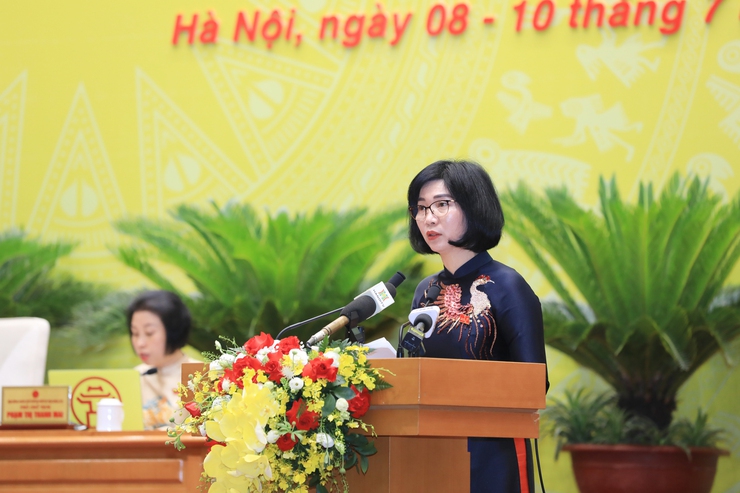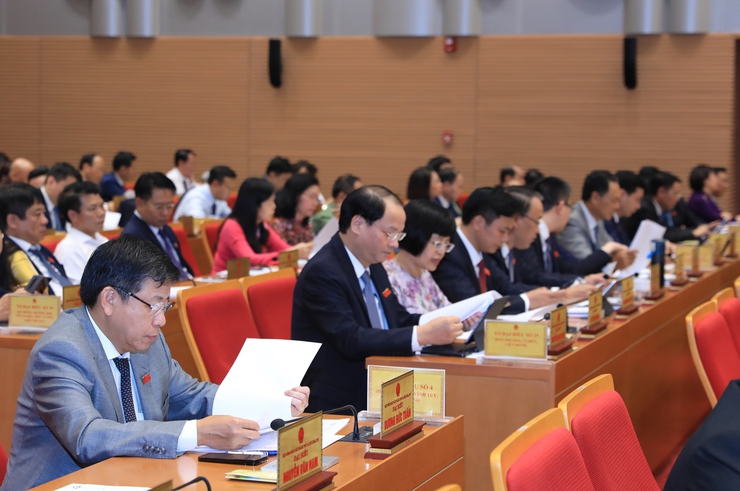Phung Thi Hong Ha, member of the Standing Committee of the Party Committee and Permanent Vice-Chair of the Council said that the Council has closely followed guidance from the Central Government and the Party Committee, operating under the principles of initiative, cooperation, responsibility, and effectiveness.
Key priorities included implementing the revised Capital Law, restructuring Party and government bodies, and promoting socio-economic development with a growth target of 8 percent or higher.
Since early 2025, the Council has issued a work program comprising 106 priority items.

Vice Chairwoman of the Hanoi People's Council Phung Thi Hong Ha.
Ha said that on March 3, 2025, following Party restructuring and the conclusion of the City Council Party Delegation's term, the Party organization for the City Council for the 2020–2025 term was formally established.
Soon after, the Council’s Standing Committee successfully held the first Party Congress for the 2025–2030 term to continue guiding the implementation of the 2025 work program.
She emphasized that the Standing Committee completed several critical tasks on schedule, in line with the action plan and directives of the City Party Committee for restructuring administrative bodies and implementing the two-tier local government model from July 1, 2025.
Key tasks included contributing opinions on constitutional revisions, the amended Law on Local Government Organization, and related legal frameworks; consulting with National Assembly agencies and central ministries on the proposed local government structure before its approval; and issuing guidance on the establishment of commune and ward councils as well as personnel selection following restructuring.
The Council also completed the review and resolution process for appointing leadership in the 126 newly reorganized communes and wards, issuing 377 appointment resolutions in accordance with regulations.
The Council also held a special session to adopt resolutions on adjusting municipal budget estimates, decentralizing financial management in selected economic and fiscal areas, and allocating revenue and expenditure responsibilities.
Other resolutions covered the acquisition of public assets and adjustments to the mid-term public investment plan for 2021–2025. The Council also approved a proposal authorizing the People’s Committee to provisionally manage staffing under the new two-tier local government system, effective July 1.

Delegates at the session.
The Standing Committee issued detailed guidance on the tasks of the councils in the newly structured communes and wards, emphasizing the organization of their first meeting on July 1. Representatives from the Standing Committee, its leadership, committees, and office attended these meetings to provide direction and gather information from grassroots levels.
Ha recalled that since early 2025, the Hanoi People's Council has held four special sessions to address urgent, important issues. It prepared all session materials continuously and rigorously, leading to the passage of 48 resolutions.
These decisions covered key policies to support socio-economic development, public investment, social welfare, and provided a legal framework for implementing the two-tier government model and personnel matters.
She emphasized that the organization of sessions and the quality of resolutions have improved significantly. The adopted resolutions are legally sound, practical, and implementable, and authorities at all levels have been executing them as required.
In addition, the Standing Committee, its committees, and delegation groups have carried out targeted oversight activities as planned. These efforts prioritized site visits and flexible responses to urgent issues and constituent concerns, contributing to more effective supervision.
The Council continues to monitor the implementation of oversight recommendations, assigning responsibility to committee leaders and the Office of the National Assembly delegation. When progress lags, the Council issues reminders or raises unresolved issues through questioning during sessions or via the Standing Committee.
Looking ahead, Phung Thi Hong Ha stated that the People's Council will continue to innovate and improve its effectiveness to meet the increasingly high requirements of state management and Hanoi's practical needs. The Council will coordinate to review and guide the new local government bodies at commune and ward levels to ensure consistent, efficient operations and improved service to residents and businesses.
The Council will also work to complete regulations, mechanisms, and policies for enforcing the Capital Law, the general urban development plan, and the 2025 work plan resolutions. It will maintain strong oversight, questioning, and accountability on socioeconomic development, administrative restructuring, and solutions to pressing public issues and living standards.
The Council plans to expand direct voter engagement to gather opinions and address constituent feedback in a timely manner. It will strengthen public reception and the resolution of petitions and complaints. The Council will also accelerate administrative reform, enhance discipline, and improve public service quality among civil servants and officials.